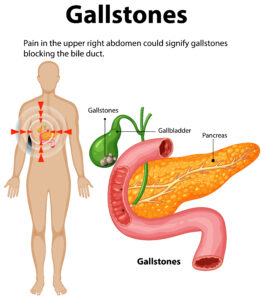
Gallstones may be small in size, but they can cause big trouble when it comes to your digestive health. These solid particles form inside your gallbladder and can cause sudden pain, nausea, and even serious complications if ignored. Whether you’re just starting to feel some discomfort or you’ve had recurring digestive issues, it’s important to understand what gallstones are, why they happen, and how they can be treated—especially if you live in Surat, where expert care is available.
In this blog, we’ll break down the common symptoms of gallstones, what causes them, how they’re diagnosed, and the best treatment options in Surat so you can take control of your health and find relief.
What Are Gallstones?
Gallstones are hardened deposits of digestive fluid, mainly cholesterol and bile salts, that develop in your gallbladder. Your gallbladder is a small, pear-shaped organ located under your liver. It helps digest fats by releasing bile into the small intestine.
These stones can range from as small as a grain of sand to as big as a golf ball. You may have one large stone or several smaller ones. Not everyone experiences symptoms, but when gallstones block a bile duct, it can result in intense pain or complications like gallbladder inflammation (cholecystitis).
Common Symptoms of Gallstones
Many people have “silent” gallstones and don’t feel anything. But when symptoms show up, they can be quite painful and disruptive. Here are the most common signs:
- Sudden pain in the upper right side of the abdomen
- Pain that radiates to your back or right shoulder
- Nausea or vomiting after eating a fatty meal
- Bloating or indigestion
- Fever or chills (if infection is present)
- Yellowing of the skin or eyes (jaundice)
If you’re facing any of these issues, it’s time to speak with a specialist. Early diagnosis leads to quicker and less complicated treatments.
What Causes Gallstones?
Understanding the cause can help you prevent gallstones or manage them better. Here are the main risk factors:
✅ High cholesterol in bile
If your liver secretes more cholesterol than bile can dissolve, it may form crystals and eventually gallstones.
✅ Poor gallbladder emptying
If your gallbladder doesn’t empty completely or often enough, bile may become concentrated and contribute to stone formation.
✅ Obesity or sudden weight loss
Being overweight or losing weight rapidly can increase the cholesterol content in your bile, raising your risk.
✅ Diet high in fat and low in fiber
Unhealthy eating habits are directly linked to gallstone development.
✅ Family history and genetics
If gallstones run in your family, you might be more likely to develop them too.
✅ Diabetes and liver disease
Both conditions can influence how bile is processed in the body, increasing your chances of forming stones.
Diagnosing Gallstones
If you’re experiencing symptoms, your doctor might recommend the following tests:
- Ultrasound – Most common and painless method to detect gallstones.
- CT Scan or MRI – Used for detailed images if complications are suspected.
- HIDA Scan – To check gallbladder function.
- Blood Tests – To look for infection or problems in your liver, pancreas, or bile ducts.
Best Treatments for Gallstones in Surat
Depending on the size, number, and symptoms of your gallstones, different treatment options are available:
1. Watchful Waiting
If gallstones aren’t causing pain or complications, no treatment may be needed. Your doctor may recommend regular monitoring.
2. Medications
Certain oral medicines (like ursodiol) can help dissolve cholesterol-based gallstones. However, this process is slow and may take months or years. It’s not always effective, especially for large stones.
3. Surgery – Gallbladder Removal (Cholecystectomy)
This is the most common and effective treatment, especially for symptomatic gallstones. It can be done using:
- Laparoscopic Surgery – Minimally invasive and allows faster recovery.
- Open Surgery – Recommended for severe or complicated cases.
Most people live healthy lives without a gallbladder, as bile flows directly into the intestine after removal.
4. Endoscopic Treatment (ERCP)
Used when gallstones are stuck in the bile ducts. A flexible tube is passed through the mouth into the digestive tract to remove the stones.
If you’re searching for the best gallstone treatment in Surat, consult a digestive health expert or one of the top 10 gastroenterologist in Surat for accurate diagnosis and care.
Home Tips for Gallstone Prevention
Even if you’ve never had gallstones, you can take steps to reduce your risk:
- 🥗 Eat a balanced diet rich in fiber, fruits, and vegetables
- 🚶 Stay physically active and maintain a healthy weight
- ❌ Avoid skipping meals or extreme dieting
- 💧 Drink plenty of water to help flush out toxins
- 🥘 Limit fatty, fried, and processed foods
These small steps can help keep your gallbladder happy and functioning smoothly.
When Should You See a Doctor?
If you feel frequent pain after meals, suffer from bloating or nausea, or experience jaundice or fever, don’t delay. Gallstones can lead to infections, pancreas problems, or even emergency surgery if untreated.
Getting in touch with a qualified gastroenterologist in Surat will help you find the right diagnosis and treatment at the right time.
Final Thoughts
Gallstones are common but manageable with the right care. Recognizing early symptoms and seeking expert help is the key to avoiding unnecessary pain and complications. If you’re living in or near Surat, you’re fortunate to have access to some of the best healthcare professionals in the field of digestive health.
With support from a trusted specialist, tailored treatment options, and healthy lifestyle changes, you can say goodbye to gallstone pain and live more comfortably.
